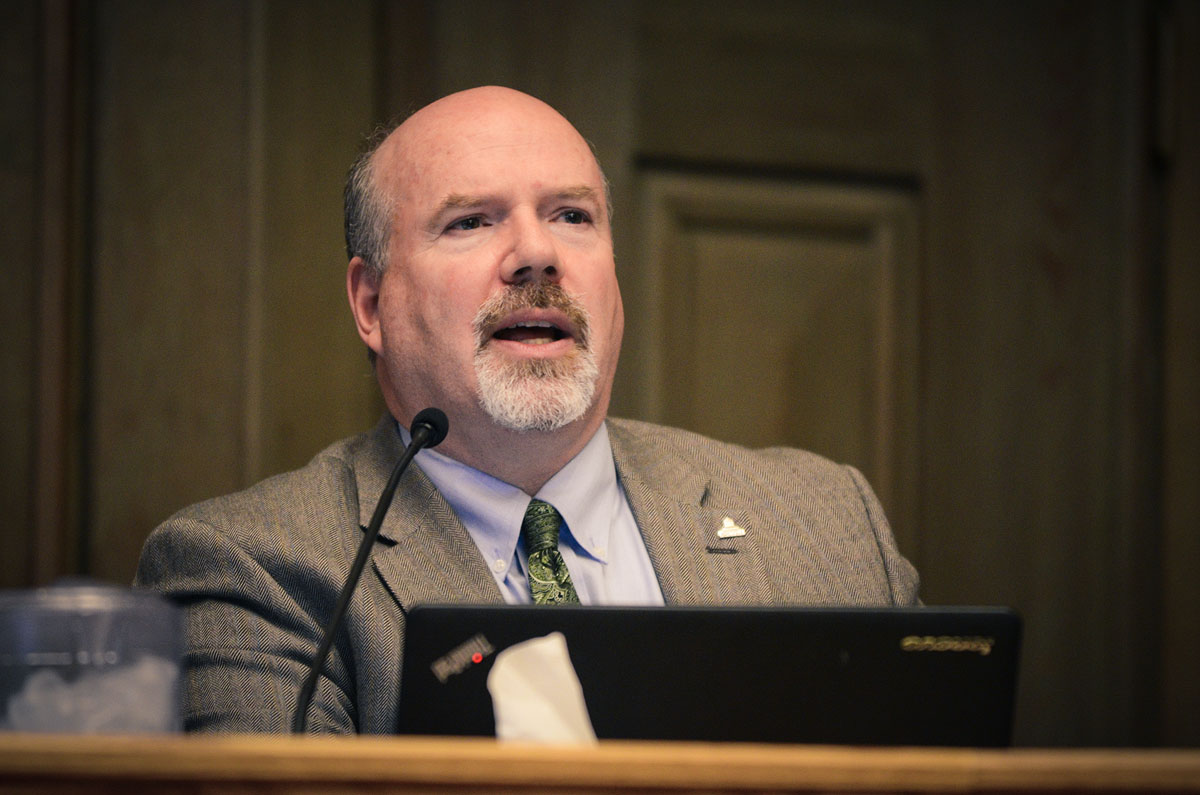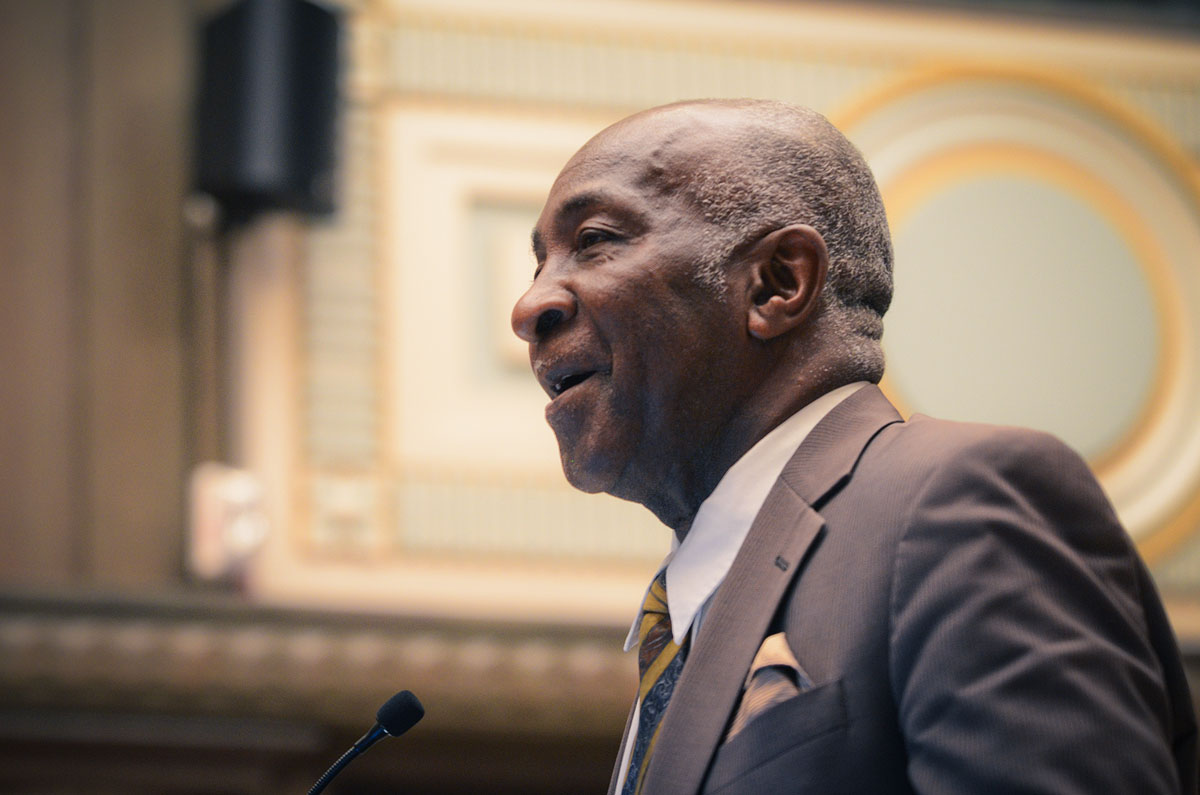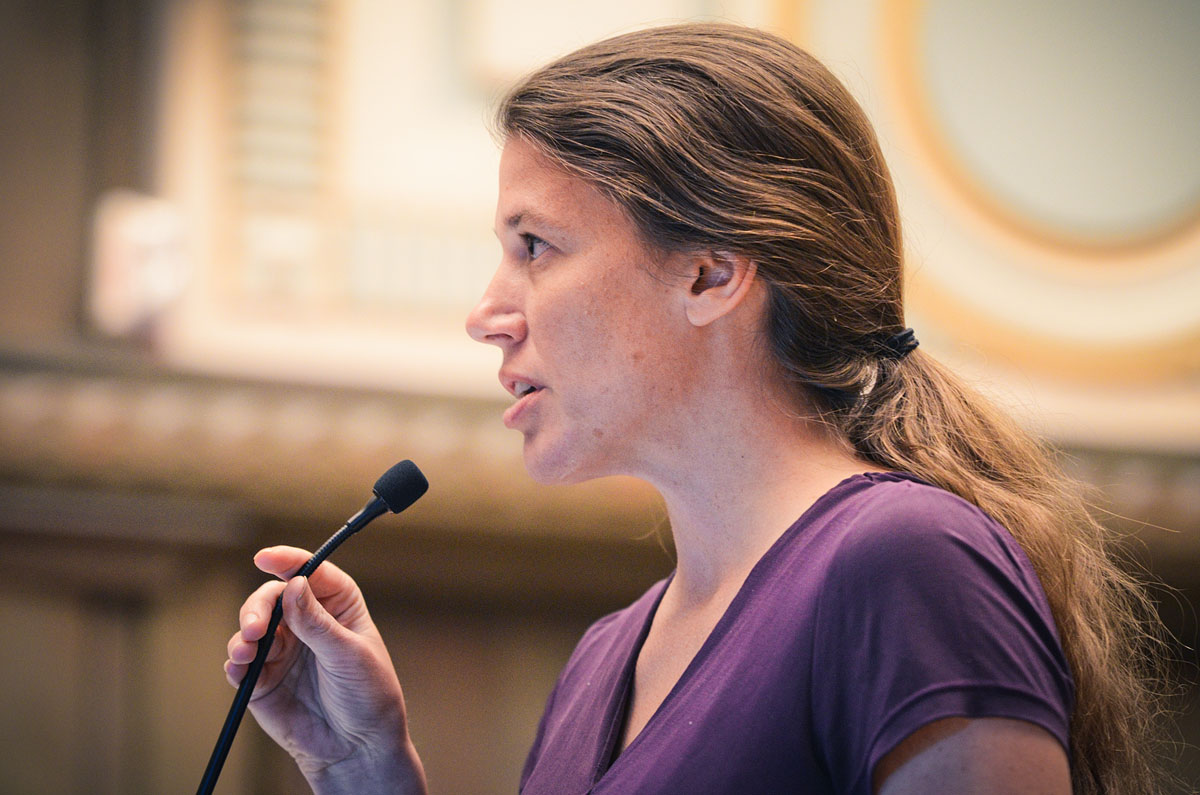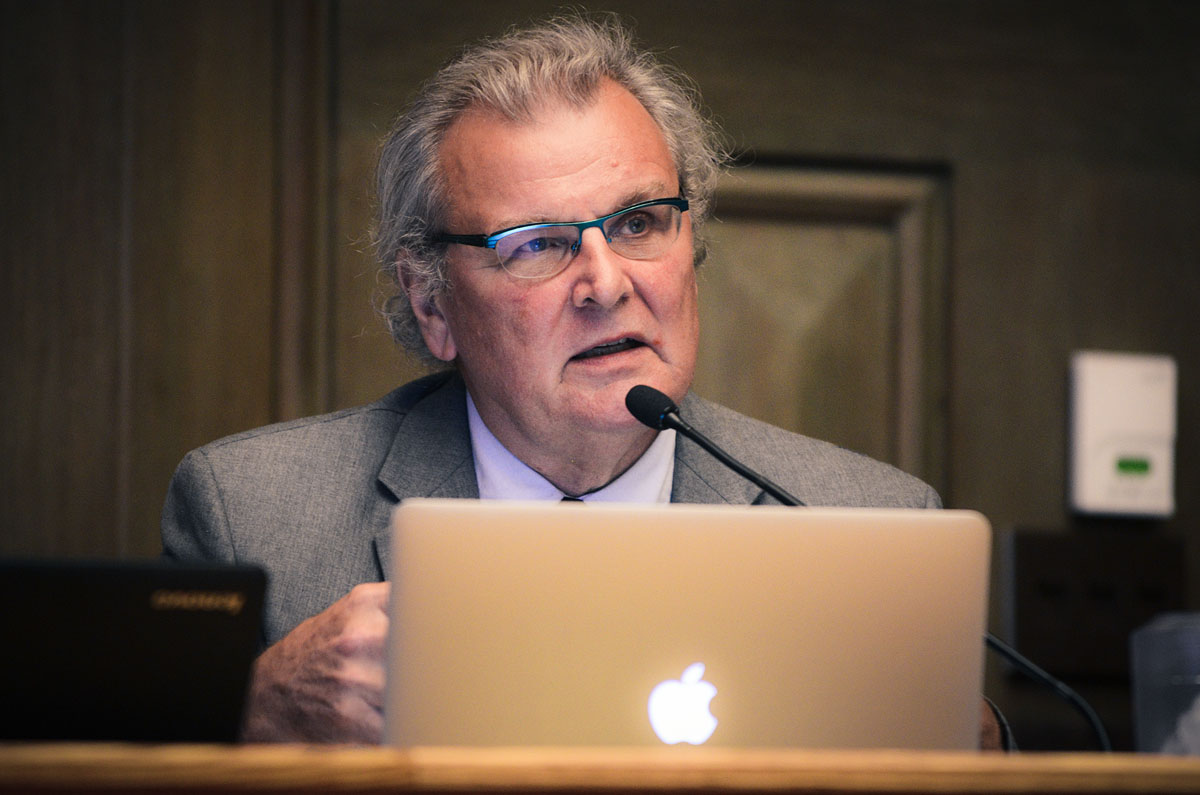


The public weighs in on the budget’s ‘moving parts’ while Council gets an earful, wrangles over numbers and disagrees on a few key points
Above: Mayor Esther Manheimer during the June 9 budget hearing. Photo by Max Cooper.
As the Blade (and some of the area’s other media as well) have been following fairly closely, Asheville City Council is currently engaged in possibly its most important decision-making of the year: the budget. Or, put another way: deciding how to spend the public’s money, and to benefit whom.
Everything from police to sidewalks to affordable housing comes down to a single presentation, hearing and vote, all before July 1. On June 9, Council held the public hearing on its $154 million budget. Despite its importance and the controversies underlying it, Asheville’s elected officials have, in some years, only seen relatively little public debate on the budget.
But this year the differences over the budget, both on the Council dais and off, played out over two hours, longer than some entire meetings, and it dominated the evening. The public gave Council an earful on everything from living wages to transit to taxes to funding nonprofits, and on top of that, there was plenty of debate among the officials themselves over what should be done.
The past and prologue
For months staff and elected officials have crunched numbers and held meetings to determine the shape of this year’s budget. As they have presented it, they face the challenge of declining revenues from the state, a growing city, aging infrastructure and the aftereffects of the recession, especially the impacts of freezing staff positions and pay to make ends meet during those years.
So the budget emphasizes putting more resources into city staff (with some major changes in pay scale and the equivalent of 36 more full-time positions since last year’s budget) economic development and infrastructure (especially in three “innovation district” areas) while it continues services at their current level. It’s also supposed to raise city employees up to a living wage — the fact about 1 in 10 city workers make under that amount has caused some controversy — but so far staff have backed the budget away from that goal.
To deal with the loss of revenues from a business license tax due to state legislation and the demands of a changing city, the city proposes increasing property taxes (by about $15 a year per $100,000 of a property’s value) and have increased fees on everything from stormwater to trash to block parties to try and put some more revenue in the city’s coffers. In total, the budget climbed to $154 million from $147 million last year.
The hope — at least the justifications coming from City Hall — is that more staff will improve service, the increased taxes and fees will keep enough revenue in the coffers without burdening anyone too much and pouring resources into those “innovation districts” will create downtown-style growth that will boost revenues and benefit the city as a whole. Naturally, as with any important matter in local politics, not everyone agrees.
Of course, $154 million is a lot of money, covering a lot of different things for a lot of different agendas. If you want to know more about some of the budget’s specifics, our earlier analysis delves into where it directs money and some of the goals and controversies underlying how to use this particular pile of cash. Also, DemocracyApps (with help from Code for Asheville and the Asheville Coders League), have built a handy tool for the public to delve further into the budget as well.
On top of everything the budget does (and doesn’t) spend money on, in the period between the budget presentation and this meeting, news emerged that the state legislature will increase the room tax, with the money going to the Tourism Development Authority. The city had hoped to work with the TDA, the Chamber of Commerce and the legislative delegation to get part of an increased room tax going directly to the city, but instead the TDA and chamber went directly to state legislators to get an increase for room tax funds, mostly dedicated to more marketing. That dispute would also affect the meeting’s events.
As Vice Mayor Marc Hunt later noted, this year “there seem to be more moving parts.”
Full credit
One of the major pieces of the budget was the loss of revenue from the business license tax and the property tax hike that (most of) Council and staff asserted was necessary to make up those funds.
Council members had questioned staff via email among themselves before the meeting began and even before the hearing, differences started to emerge.
“What staff is really looking for tonight is really direction for the budget adoption,” Chief Financial Officer Barbara Whitehorn said. “How would you like us to go from here? What do you want to see in your 2015-16 budget?”
On the tax front Council member Chris Pelly was a good deal more hesitant than most of his colleagues, noting that this would be the second tax hike in two years and one he was more eager than his fellow Council members to avoid, wondering if the city could use its reserves to weather out the reduced revenue for a year.

Council member Chris Pelly, who objected to the budget’s proposed property tax hike. Photo by Max Cooper.
But Whitehorn, one of the budget’s main architects, said that it wasn’t just a simple matter of pulling money out of the city’s savings or whether Council thought the tax increase was a good idea; there was also the matter of its credit rating.
While it doesn’t get much attention, the city’s credit rating is one of those hidden elements that lurks behind many of the other aspects in the complicated web that’s the budget. This rating (Asheville’s is relatively good, and was last raised in 2010) affects how much the city can borrow, its rates on its current debt, and more.
So Whitehorn, in response to a question from Council member Cecil Bothwell about the effect of drawing from its reserves instead of hiking taxes, warned heavily against Council making up the difference that way, noting that would offset the formula credit rating agencies use and likely cause them to reduce the city’s rating.
She noted that “$700,000 would really be the maximum to stay within the metrics the rating agencies use to determine that we’re at a AA rating level for our financial management.” To avoid raising taxes or cutting services, the city would need to pull $1.5 million from reserves.
Bothwell added, and Whitehorn agreed, that to have the capital to pursue its planned infrastructure projects, the city needed to maintain its credit rating.
Pelly noted to Whitehorn that “I hear what you’re saying” and asked what the difference between the bond ratings was, adding that “interest rates are already at a record low.”
Whitehorn replied that she couldn’t really speak to that without further research.
Mayor Esther Manheimer also asked about the living wage increase for “temporary/seasonal” workers that don’t currently receive one, and Whitehorn responded that “the budget has a placeholder for those increases, staff are still working on how that should be implemented.” At a previous meeting and in an email exchange with the Blade, Whitehorn noted that implementation will use $250,000 to give some of those workers a raise to a living wage, but not others senior staff regard as “truly temporary.”
Weighing in
Last year, just a few people commented on the city’s proposed budget. The June 9 meeting couldn’t have been more different, as multiple parts of the city budget came up for discussion and debate from the public.
Opponents of the tax hike and city spending had the first tilt, as it came in for early criticism from some of the speakers who asserted that the proper response was for the city to tighten its belt or use reserves rather than increase spending.
“I’m listening to some of these Council members and they’re trying to blame other people, other agencies,” developer Chris Peterson said. “My assessment is that this Council has a tremendous spending problem.” He specifically criticized the budget increases, including staff salaries, incentives for the New Belgium brewery, greenways and River Arts District infrastructure overhaul as “corporate welfare at its worst.”

Developer Chris Peterson, criticizing the increased taxes and spending in the budget. Photo by Max Cooper.
“The city manager’s solution to getting his higher-spending budget approved is to raise taxes and fees,” Ken Michalove, a former mayor and frequent critic of Council’s spending, said. “My direction to City Manager [Gary] Jackson would be that there shall be no tax or fee increase in property taxes or fees. Give us a budget that shows the cuts needed to balance the budget by reducing expense in the general government area of administration. Adding to the tax rate is not a one-time thing; the tax rate is never reduced.”
Transit Commission Chair (and Council candidate) Julie Mayfield read a statement from the board praising Council for preserving bus service (including the Sunday service they started funding last year) in the face of some considerable pressure while also asserting that more is needed.
“The transit budget has steadily increased over the past five years, one of the few budget line items to do so,” Mayfield said. “But while many improvements have been made to the system since the implementation of the Transit Master Plan in 2012, there are still many more needed before the system achieves its potential and fully serves our residents. Indeed, we remain seven years behind the schedule of improvements laid out in the master plan.”
The committee had requested an additional budget on one of the South Asheville routes, later service on several routes, improved service to A-B Tech and another transportation planner. None made it into the budget.
“We are disappointed there was not room in this budget for these improvements and we will remain steadfast in our request,” she continued. “Our bus service lags behind many in cities we like to compare ourselves to.”
The need for more infrastructure outside the “innovation districts” the budget puts much of its focus on also came up. Two Five Points residents said more sidewalks and pedestrian-friendly improvements are desperately needed there, and that funds should be shifted from areas less necessary to safety.
East West Asheville Neighborhood Association representative Rich Lee (also a Council candidate this year), called for Council not to delay improvements to the Craven Street bridge to deal with the future traffic from New Belgium, as while “we understand the physical constraints, we hope that happens as soon as possible.”
Speakers from several groups said that the city should reconsider its distribution of funds to outside groups, non-profits that the city helps fund to provide a variety of services. The budget proposed allocating $98,400 in funds for that purpose. But local groups requested a total of $315,885 and the budget left out some groups the city has worked with for many years.
Representatives from those groups said the city needed to find more to help with those programs or it would risk leaving many already struggling communities under-served for want of relatively small amounts of money.
“I understand when you look at your budgets a lot of things are considered,” Dewana Little, who’s Asheville Greenworks’ Cultural Engagement Director and has also worked with Asheville Green Opportunities, told Council. “We work with the low-income community, we have progams that support them on top of the clean-ups we do across the city,” as does Green Opportunities.
“I feel like a lot of the time when we talk about the budget and we listen to a lot of people speak, the low-income communities of Asheville are overlooked,” Little continued. “These programs have been overlooked when they’re not recommended in the budget.”
L.C. Ray, of One Youth at a Time, implored Council “to take a second look” at its grant request given the organization’s long record of working with the city and helping at-risk youth.

L.C. Ray, of One Youth at a Time, urges Council to put more funds towards partnerships with non-profits that provide services to struggling communities. Photo by Max Cooper.
Greenworks requested $20,000, Green Opportunities $17,500 and One Youth at a Time $5,000.
Multiple speakers asked Council to extend the living wage to all city employees, a topic that increased in prominence after a Blade investigation last year revealing the extent of city workers paid under a living wage.
Vicki Meath, executive director of Just Economics, which certifies living wage businesses and helped craft the city’s living wage ordinance, said that Council needed to seriously move toward paying all of its workers a living wage.
“I also wanted to thank this Council — and city staff — for allocating funds to increase wages for temporary, part-time and seasonal employees,” Meath said, but “I’d like to encourage this Council to apply that to all city workers.”
“We at Just Economics believe that our living wage is a more just minimum than the minimum wage and we believe that every worker needs to make a living wage,” she continued.

Vicki Meath, of Just Economics, asserting that the city needs to pay all its workers a living wage. Photo by Max Cooper.
Jenny Bowen, a former city employee who was categorized as “temporary/seasonal” despite working consistent hours for the city from 2009-13, also said it was time to give all the workers a living wage.
“I never made a living wage, I subsisted off of subsidized affordable housing and food stamps,” Bowen said of her time working for the city. “My hope for you is that if the budget comes to you and there is any classification of employee that is not paid a living wage that you send it back to staff and ask them to bring it forward again with no exceptions.”
She said that the fact that “temporary/seasonal” workers made under a living wage “allow staff to abuse that line item in the budget” and if all city workers weren’t paid a living wage, the exceptions would inevitably be exploited. Based on her time at the city, she believed that rather than the resentment over a wage hike predicted by senior staff, many rank-and-file staff were good people who wouldn’t resent others making enough to live off of as “good workers deserve a good wage, end of story.”
Local activist Martin Ramsey asserted that for Council to allow an exception to giving all city workers a living wage “is a shameful parsing into worthy and unworthy categories. This is within your power to do so and I would encourage you to take it very seriously.”
Grin and bear it
Once the public finished weighing in, Council resumed its budget wrangling as Whitehorn emphasized she needed “closing direction” to make any changes to the budget before Council votes on it June 23. The discussion of those differences took about an hour in its own right.
Hunt started things off by proposing that, since Whitehorn had noted that Council could use $700,000 from its reserves without endangering its credit rating, those funds should go towards one-time projects to speed up the improvements to the Craven Street bridge and the affordable housing trust fund.
“We think we’ve pretty much got this nailed down but then we’re here and there’s still a lot to talk about,” Council member Gordon Smith said. He noted his priorities were affordable housing, “walking the talk” on a living wage policy (though he didn’t specify if that would extend it to all employees), and transportation infrastructure. Like Hunt wanted some of that $700,000 for the Craven Street bridge, with the remainder going to the trust fund or pedestrian and transit improvements.
“There are a lot of troubling things that lead us to this budget,” Smith continued, including increasing restrictions from the state on city revenues and the room tax situation. “There’s a lot of uncertainty and overall a shift from the wealthiest people in our state and big corporations, shifting the tax burden from them to the poor and the middle class. In some ways I think this budget is reflective of that.”
Bothwell later noted, toward the end of Council’s discussion, that “I think we’re agreed about a pay increase for employees and getting to a living wage for all of our part-time employees. I think that’s really, really important. That dollar figure for getting to that amounts to a very small part of that tax increase.”
“It’s not much to me to pay $10 more on my property tax in order to not be bidding down the wages in Asheville. The city should be supporting better wages in Asheville. We support them when we try to get businesses here that pay better, we should be paying our own employees a living wage.”
Here too, the rubber met the road on the tax question.
“Yes, I know we’re being squeezed by the state, but I feel like a tax increase should be a last resort and I don’t feel like we’re at a place yet where we’ve made the case to the public that this is the only option available,” Pelly said.
Council member Jan Davis also expressed concerns about the tax increase, noting that he felt the earlier discussion about spending $700,000 from the fund balance “seemed very cavalier.”
“We’re playing with people’s lives that work hard every day and one-and-a-half cent [property tax hike] does mean a lot to them,” he said.
Manheimer asserted that she didn’t want to raid the city’s rainy day fund to make up a gap in revenue that would be there next year as well; better in her view to raise taxes and keep the city on firm ground.
“Basically you’re kicking the can down the road,” she asserted, and it might endanger the city’s credit rating in the process. “If we’re going to honor making sure every city employee makes a living wage, if we’re going to honor the recommendations we received for adjustments to salaries for personnel, if we’re going to ask the city manager to craft a budget that doesn’t incorporate the penny-and-a-half, we’re looking at a different budget, we’re looking at cuts.”
Whitehorn backed up Maheimer’s assessment, noting that credit agencies would look harshly on a city using fund reserves to meet ongoing expenses.
But a lot can change in a year, and in a growing city Pelly observed to Whitehorn that with “$700 million in new development projects in the pipeline, in the works, coming online in the next one to four years that’s naturally that’s going to translate into significant additional property taxes.”
“My argument for using the fund balance is a recognition that in future years we’re going to have additional property tax revenues coming in based on projects in the works,” he added, asking Whitehorn would that would mean.
But Whitehorn noted that of about $550 million in taxable development in the pipeline, some wouldn’t pay taxes for a number a of years due to the economic incentives that helped bring them to town, or to how long the projects would take to complete.
“It’s not an easy calculation, and it’s not something you can look at like ‘next year it’s going to be better,’” Whitehorn replied, adding it could be 2018 before taxes from these projects really started to roll in. “They’re not immediate, that’s one of the most difficult things with financially managing a city.”
Pelly noted that if the state “inflicts more damage on us” it could mean even more tax increases in the future, “going from bad to worse and I’d rather, if we can patch one more year and then see what our picture looks like” adding that “I want to put that off as far as we can, responsibly.”
“I’ve heard Council member Pelly wants to hold off until next year,” Manheimer said, tallying up Council members’ opinions shortly after. “Conveniently, he won’t be here” as Pelly’s not running for re-election this year.
Council member Gwen Wisler agreed with Manheimer, noting that some of the increased funds were necessary to fix the Asheville Police Department and “pay a living wage, that’s not just next year’s issue. We’re going to continue to have that commitment.”
Despite his reluctance, Davis noted that “Gwen makes a good point,” and ended up supporting the increase as well, but had issues with pulling $700,000 out of the reserves for other uses.
Council then agreed to decide the allocation of those funds at a later meeting, after the budget’s passage.
When it came to the non-profits the city cooperates with, Council reached a consensus around allocating $50,000 more to organizations like Greenworks, Green Opportunities and One Youth at a Time, asking Council’s Housing and Community Development committee to work out the exact grants before Council votes on the budget at its next meeting.
The budget proposed raising the amount the chamber-run Economic Development Coalition receives. Given the room tax controversy, some on Council thought it was time to cancel that raise and seek a different use for those funds.
Bothwell said he doubted that the EDC actually did much, asserting that many of the big businesses they claimed to grab would have come to the city anyway, and he’d rather see the $40,000 go to groups like GO and Greenworks.

Council member Cecil Bothwell, one of three who opposed giving more money to the Economic Development Coalition due to the room tax controversy. Photo by Max Cooper.
“I don’t think the chamber has been a partner to the city in a lot of ways, on a lot of big issues,” he said. “I see the EDC efforts often resulting in taking credit for things that might have happened anyway. New Belgium had two cities on its list, they picked them for interstate intersections and we won because of our water and employees would rather live here.”
Smith also said the he was “troubled” by increasing the amount to the EDC, and while “they do a lot of great things in a lot of ways, when it comes to some of these bigger picture issues” like the city retaining the privilege license tax or increasing the room tax, “they haven’t been as good a partners,” even actively working against the city. “To offer more money while they’re actively working to withhold seven figures from us is hard to swallow.”
Pelly also wanted to keep the funds to the EDC at the same amount, without an increase.
But a slim majority felt otherwise. While all the Council members expressed regret at the chamber backing the room tax without them, they also felt that they still merited more money than before.
“We feel let down by our partners over there,” Davis said, but he added that the TDA also planned to make it easier for municipalities to receive grants from some of the cash it collects from the room tax. “I do think they are an honest and worthy partner in economic development. I feel like to shortchange them at this point may send a message, but it may be a bad message.”
As Council’s representative on the EDC, Hunt praised the organization as efficient and effective, attributing Linamar and New Belgium moving to the city to its efforts. “My view from the inside is that it’s important not to mess with that too much from the standpoint of political differences.”
“I’m disappointed in the leadership of the chamber and the tourism industry,” Wisler said, but she still supported giving them more city funds because, contra Bothwell, she believed they played an essential role in attracting companies and “I think withholding the increase wouldn’t have an effect.”
“We made the case Asheville’s different, we wanted to see something more progressive done with the room tax,” Manheimer said. “We see the hotel industry, while a benefit to many in our community, not an industry that supports great jobs and ultimately results in a large portion of our population that needs subsidizing.”
But “we’re working to better understand each other’s positions” and despite her own concerns and those she said she’s heard from locals about the growth of the hotel industry, she didn’t feel the EDC funds were tied directly to the room tax issue.
“No good comes out of a complete stalemate, I want to continue to work with the partners in our community because we simply have no other choice,” she said. “It’s incumbent upon the city to demonstrate our part of the bargain. We need to be the better person in this debate.”
—
The Asheville Blade is entirely funded by its readers. If you like our work, donate directly to us on Patreon. Questions? Comments? Email us.